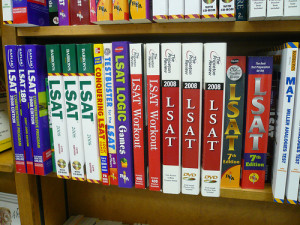My college roommate and I visited Florence, Italy in the summer of 1990. After spending one month in London with nearly 200 students from our college, we took the opportunity to do a little sightseeing before heading home.
In the days before cell phones, we purchased phone cards (still used in many parts of the world) to use with pay phones to call home. In Florence, I checked in with my parents to let them know where we were.
My mom had some information for me as well. My LSAT score came in.
She read me the score, and I began to formulate Plan B for my life. Law school would still be possible, but not very likely.
Looking back at the ebb and flow of my career, I do not regret missing law school one bit. I did not carry the debt and did not have to work in a meat-grinding law firm to pay it off.
The LSAT, like my SAT to get into college, proved I did not excel at taking tests. Despite my deficiencies in test taking, I have managed to have a solid professional career.
I do not know if my son will excel at taking tests. In our educational system, standardized tests continue to set the benchmark (do not get me started) for advancement, graduation, college and graduate school.
But what about helping students develop practical intelligence? Why do we teach to tests, but not take the time to teach kids how to balance a checkbook?
You and I need to teach the practical.
You and I need to teach life skills necessary for them to function and to flourish.
You and I need to prepare our kids for the real world.
If you have read this blog for any period of time, you will know I really respect the work Dr. Tim Elmore does. I recommend you read this article about replacing entitlement with ownership and developing life skills. Once again, Dr. Elmore nails it!
We dads should seize this great opportunity to help our kids grow and mature. We naturally instruct and guide our kids with practical, how-to advice. This list demonstrates just a few of the ways I have tried to develop practical intelligence with my 10-year-old son:
- Opening doors for others…especially women
- Making good food choices
- Shaking hands and having good eye contact
- Separating laundry
- Cooking and using spices
- Making the bed and basic cleaning around the house
- Saving money and spending money
- Being polite and respectful
This aspect of fatherhood excites me because the possibilities are endless and limitless. Certain practical intelligence skills require your kids to hit a certain age, but overall we can instill life skills from an early age forward.
Best of all, I am certain you are already doing it…just take a moment to list what you have already taught, and then make a list of your next lessons.
When did you have a blast teaching your kids a particular life skill? Which life skill is next on your list to teach?


